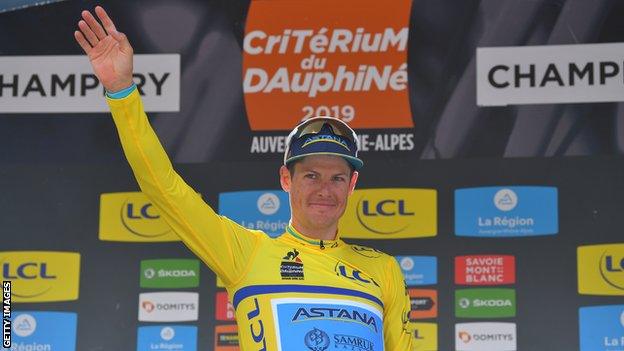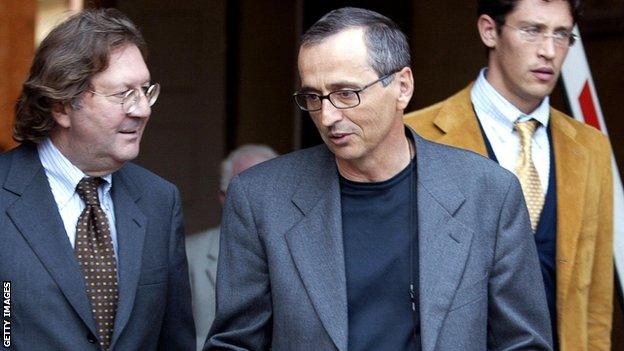Jakob Fuglsang: Astana rider denies links to banned doctor Michele Ferrari
- Published

Jakob Fuglsang won the 2019 Criterium du Dauphine before crashing out of the Tour de France
Astana rider Jakob Fuglsang has denied working with banned doctor Michele Ferrari following reports claiming he has been investigated for training with Lance Armstrong's former medic.
Danish outlets Politiken and DR and Norway's VG claim to have a leaked 2019 Cycling Anti-Doping Foundation (CADF) report that alleges Fuglsang has been seen working with Ferrari.
It also alleges team-mate Alexey Lutsenko met with Ferrari and that the banned Italian was present with Astana at the 2019 Volta a Catalunya.
Ferrari was banned for life in 2012 by the US Anti-Doping Agency (Usada) for his part in the Armstrong doping scandal and any rider caught working with a banned doctor could face a two-year suspension.
"I contest that I have met with Dr Ferrari," said Fuglsang.
"I am not aware of any report and I can confirm no procedure has been opened by competent anti-doping authorities against me.
"Accordingly, I have no case to answer.
"I am extremely concerned that such rumours could be spread out in the press."
Denmark's Fuglsang, 34, had the most successful year of his career in 2019, winning one-day 'monument' classic Liege-Bastogne-Liege, prestigious stage race the Criterium du Dauphine and a stage of the Vuelta a Espana.
He also finished on the podium at one-day classics Strade Bianche, La Fleche Wallonne and Amstel Gold Race and is currently ranked second in the world.
Politiken, DR and VG say that as well as seeing the report, they have spoken to 12 people involved in cycling who allege Fuglsang has been working with Ferrari, including claims the Dane has been seen interval training behind a scooter with Ferrari near Monaco.
The outlets claim the report also alleges Fuglsang and Kazakhstan national champion Lutsenko met with Ferrari in either Nice or Monaco.
Lutsenko issued an identical statement to Fuglsang denying having met with Ferrari.
Astana said it is "committed to the fight against doping in sport" in response to the allegations.
The Kazakhstan-based outfit added: "The team requires from all its affiliated riders that they comply all the time with all obligations under anti-doping regulations, including the prohibition to be associated with banned individuals or doctors.
"The team does not collaborate with any suspicious doctor, such as Dr Michele Ferrari.
"The riders are not authorised to consult any doctors external to the team in order to perform any activity, or to be prescribed any diet or treatment, related to their performance."

Michele Ferrari (centre) was banned for life in 2012
Ferrari previously worked with Astana manager Alexandre Vinokourov, who served a two-year ban for blood doping during his racing career from 2007 to 2009.
Astana, who Armstrong rode for in 2009 after his comeback from retirement, was also investigated by the International Cycling Union (UCI) over alleged links with Ferrari in 2014, which the team denied.
Following the latest allegations, Ferrari said he had not had "any relationships" with Astana riders for "over 10 years".
"I haven't been to Monaco or Nice for at least 12 years," he added.
"I have never been on a scooter or motorbike in my entire life, let alone motor-pacing a cyclist. I haven't been to the Volta Catalunya in 2019."
The UCI and CADF are yet to comment on these allegations.
Astana said it was in contact with both the UCI and CADF "in order to know more" and that it will "collaborate with any inquiry that could be opened" by either body.
The team added in a statement: "However, for the time being, no procedure has been initiated against any rider affiliated to the team.
"The Astana Pro Team trusts that if the CADF had any evidence of wrongdoing by any rider of the team, disciplinary proceedings would have been immediately initiated in accordance with anti-doping regulations and the World Anti-Doping Code."